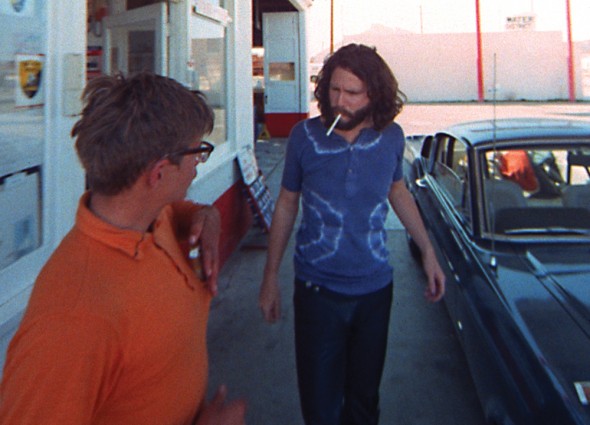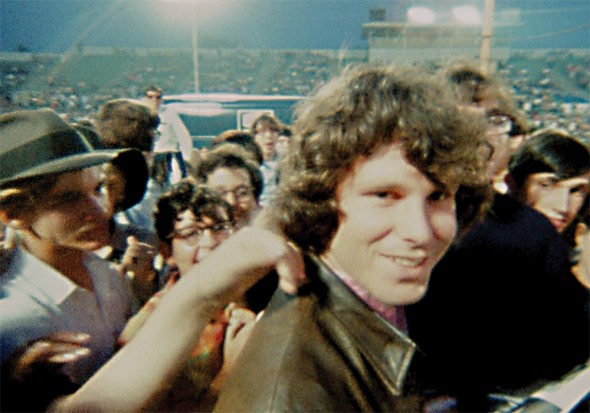
Tom DeCillo’s When You’re Strange resurrects Jim Morrison’s cosmic wandering myth.
Tom DeCillo has never made a documentary film before. The New York-based director, who gave Brad Pitt his first leading role in the film Johnny Suede back in 1991, generally leans towards dreamy, darkly comedic filmmaking. Genre-jumping is no easy feat and directing a film about The Doors, one of the most beloved American rock bands, is a baptism by fire. DeCillo has emerged unscathed, however, presenting a fascinating look at the men behind the music, comprised entirely of archival footage and excerpts from Jim Morrison’s little seen feature film Highway. “I wanted to make the film without talking heads,” DeCillo explained. “Sitting in the editing room for months looking at this footage, I felt like I was truly experiencing The Doors and I wanted the audience to share that direct experience.” When You’re Strange was nominated for a Grand Jury Prize at Sundance this year and played to a packed house at the Berlinale in Germany. Since the film’s premiere on the festival circuit, Johnny Depp has signed on to do narration. DeCillo spoke with soma about his new film and the respective challenges of narrative and documentary filmmaking.

Where did Morrison’s film footage come from?
Morrison went to ucla film school back in ‘65. He loved film, but his sense of it was completely experimental and free form. Years after leaving film school and well after he joined The Doors, he got some money together and went out into the desert with some old classmates from ucla and a 35mm camera to shoot a short feature called Highway based on a script that he wrote. What I loved about the film is how it portrayed a mythological loner figure wandering through the American landscape. Most people can’t believe that it’s Jim Morrison. We had a bizarre reaction to the film at Sundance. One distributor got up in outrage after and stormed out, convinced we used an actor.
Did he receive any recognition for the film within his lifetime?
Morrison was very proud of Highway and had real aspirations to be a filmmaker. He went to two film festivals with it, but it wasn’t very well received. Highway is a difficult film. As specific as he was with his music and image, he didn’t quite understand that the same need applies to the visual medium. The film is like an extended tone poem that doesn’t make much sense, but I respect his effort. It’s the film he wanted to make.
Did you encounter any sour grapes telling the story of The Doors?
Many former ‘60s band members are bitter about their leaders stealing the spotlight and resist perpetuating their myth. Each of the remaining band members had a different thing that they wanted to make clear and I had to honor that, but Ray Manzarek, John Densmore and Robby Krieger all effortessly praised Jim Morrison as a great friend and had no resentment for him in any way. That being said, I didn’t want the band meddling or editorializing what I was doing. There is a possessiveness about the story that bugged me a little bit. I didn’t want to just make a puff piece about The Doors.
It seems rare for an LA band in that era to praise each other as you describe, especially a flamboyant figure like Morrison.
Morrison was addicted to jumping out into the void, not knowing where he would end up. The group was an amazing safety net for him. They allowed him to go out into outer space, yet always have a place to land. I think they really cherished each other. When they got famous, there were times when the announcer at a gig would introduce them as Jim Morrison and The Doors and Jim would get so angry; he’d refuse to go on and make the announcer reintroduce them as The Doors.
Your films Johnny Suede and Delirious feature performances by Nick Cave and Elvis Costello. Did working with musicians in your narrative filmmaking influence your decision to work on a musical documentary?
I have a great love of music. The combination of music and the moving image is an incredibly powerful mixture. Nick Cave was in Kreuzberg living with my friend, who was in a German punk band named Die Haut. He read my script, because it was sitting on my friend’s table and he called me saying that he’d like to be in my movies. He had a larger-than-life presence that many serious actors never quite attain. The same goes for Elvis Costello.
Do you find that there are any parallels between your narrative filmmaking and documentary filmmaking?
I like the documentary film, but I’ve always been drawn to the documentaries that resist categorization, like Errol Morris. They have a mystery to them, a slightly surreal quality that isn’t just a presentation of fact. I discovered early on that the best thing for me to do that would help me artistically was to think of the film as a narrative feature with an epic angle. It is ultimately a tragic story. I don’t mean that in a depressing way, but every one knows what happened to Jim Morrison. A lot of my films feature characters that are struggling to understand something about themselves.
Can you speak at all to the respective challenges of documentary versus narrative filmmaking?
There was a sense of relief that I didn’t need to exhaust myself trying to eke out performances that were crucial to the success of the film. I’ve been fortunate enough to work with actors like Catherine Keener and Steve Buscemi, who relieve that pressure a bit, but it can be quite difficult. While the footage was a given, there were moments of terror trying to tell a story with a dramatic arc: surprise, revelation, joy, all of the things that go into a real film. I didn’t want to paraphrase everything that I had read about The Doors. I needed to find something truthful in it, my own perspective. Ultimately, I came to the realization that I just wanted to show the band as human beings. The footage of Jim Morrison just laughing at times or being like a young boy are, to me, the most beautiful moments in the film.
— Jesi Khadivi

